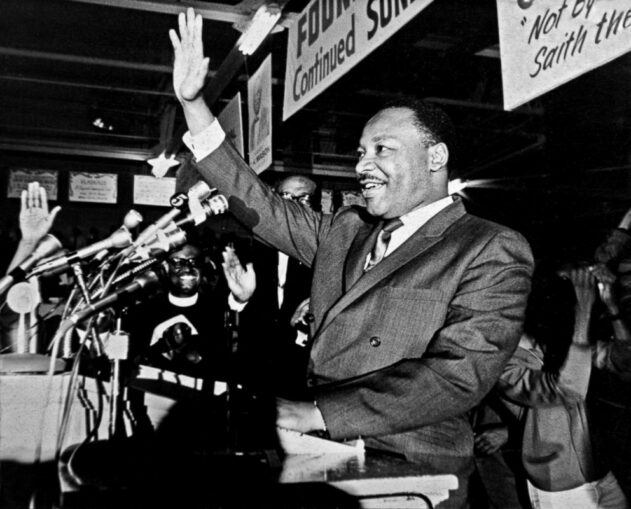Linking the struggle at home and abroad: Remembering the legacy of Dr. Martin Luther King Jr.

Dr. Martin Luther King Jr. speaks at a rally for striking sanitation workers in Memphis, Tennessee, March 18, 1968.
This April 4 will mark the 56th anniversary of the assassination of Civil Rights leader, Rev. Dr. Martin Luther King Jr., while he was supporting Black sanitation workers in Memphis, Tennessee, on strike for a living wage, safe working conditions and to be treated with dignity as Black men and as workers. King was just 39 years old when he was fatally shot on the balcony of his room at the Lorraine Motel.
On March 18, before he was killed, King made a speech in solidarity with the strike entitled “All labor has dignity.” In it he declared: “Never forget that freedom is not something that is voluntarily given by the oppressor. It is something that must be demanded by the oppressed.” (beaconbroadside.com, March 18, 2018)
Even though James Earl Ray was eventually sentenced to life in prison for his role in the assassination, there is no doubt that the U.S. government, considering the FBI’s COINTELPRO’s illegal surveillance into the private life of Dr. King, played a pivotal role in masterminding his death. King had earned the ire of the U.S. government when he opposed the escalation of the Pentagon’s role in Vietnam during the Lyndon B. Johnson administration.
On Feb. 25, 1967, during a speech in Beverly Hills, California., Dr. King stated: “The promises of the Great Society have been shot down on the battlefield of Vietnam. Billions are liberally expended for this ill-considered war. The security we profess to seek in foreign adventures we will lose in our decaying cities. The bombs in Vietnam explode at home. They destroy the hopes and possibilities for a decent America.” (Indiana Capital Chronicle, Jan. 15)
In his speech “Beyond Vietnam – A Time to Break the Silence” at Riverside Church in New York City on April 4, 1967 — exactly one year before his assassination — Dr. King stated that the U.S. is “the greatest purveyor of violence today.” He also called for a ceasefire in Vietnam.
What is little known is that Dr. King took a progressive stance on the question of Palestine in response to the 1967 Six-Day War that Israel launched, with the support of the U.S., against Egypt, Syria and Jordan, that resulted in Israel occupying Gaza, the West Bank and the Sinai Peninsula.
Dr. King remarked on the June 18, 1967, broadcast of ABC Sunday’s “Issues and Answers” that, “I think for the ultimate peace and security of the situation, it will probably be necessary for Israel to give up this conquered territory, because to hold on to it will only exacerbate the tensions and deepen the bitterness of the Arabs.” (Mother Jones, Nov. 9, 2023)
Even this view — considered so controversial at that time but considered mild today — on the situation in the Middle East helped to further deepen the hatred of Dr. King on the part of the united pro-Israeli ruling class and government in the U.S., leading to his assassination.
Anything Dr. King said publicly that even mildly questioned U.S. imperialist foreign policy was feared by the powers that be because of his powerful influence amongst the Black masses inside the U.S. and the global respect he had rightfully earned. There is no doubt that if Dr. King were alive today, he would support an end to the genocide in Gaza.

